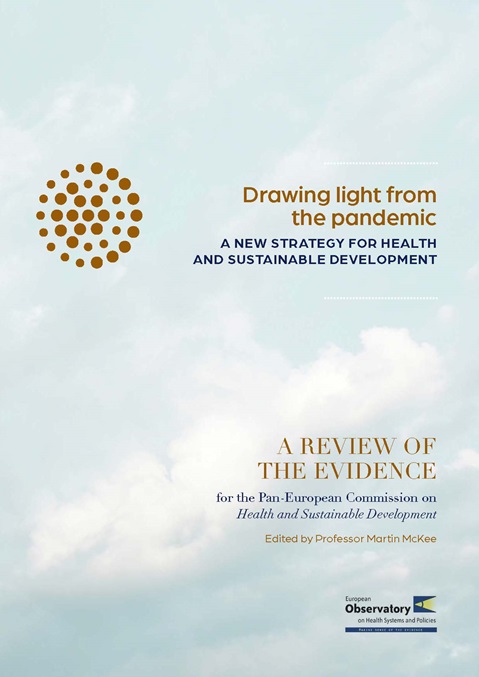Drawing light from the pandemic: A new strategy for health and sustainable development
A Review of the Evidence

Overview
In 2020,
Hans Kluge, WHO Regional Director for Europe, asked Mario Monti, formerly Prime
Minister of Italy and a European Commissioner, to convene a Commission of
leading experts from politics, finance, and life sciences to make
recommendations on what should be done to achieve health resilience and sustainable
development in the pan-European region.
The evidence on which they drew is set out in this review, led by Martin McKee
(Co-Director of the European Observatory and a Commissioner and Chair of the
Commission’s Scientific Advisory Board) with contributions from leading
academics.
This review can be divided
into two broad sections, looking at:
Problems to be solved
This section begins by asking what went wrong: why was it that countries in
Europe, including some of the richest and most scientifically advanced in the
world, did so badly. It highlights failures of leadership and of preparedness,
exacerbated by disinvestment in public health and health and social systems. It
then looks ahead at the legacy of the pandemic. Many who survived COVID-19 will
live with the consequences, including Long COVID, for years and many who died
have left grieving family members, including large numbers of orphans. A
generation of children have missed education at a crucial stage in their
development. And the relationship between individuals, governments, and
employers has changed fundamentally. This section closes with a new framework
for thinking about health, with the complex relationship between the health of
humans, animals, and the natural environment, or One Health, at its heart, but
influenced by a much wider range of factors than ever before.
Evidence that informed the
Commission’s proposals
This section begins by considering what must change. It calls for a commitment
to One Health at all levels, in political and technical structures, and in ways
of thinking. It reflects on what needs to be done to make the fractures in our
societies visible, with an emphasis on the growing number of people who lead
precarious lives, often unseen. It looks at the many things that must be done
to strengthen the resilience of health systems. It then asks how these changes
can be made, examining the theory and evidence related to global public goods
and the experience of responses to earlier threats to health, especially the
global financial crisis which led to the creation of the G20 and mechanisms
that have strengthened the banking system. It also asks how governments can be
incentivized to invest in preparedness for future health crises once this is
over. It concludes by reflecting on the concept of state sovereignty, arguing
that the countries of the world are stronger when they work together in the
interests of humanity rather than each going their own way.
This review is being published by the European Observatory on Health Systems and Policies in conjunction with the main report of the
Commission (see link below).